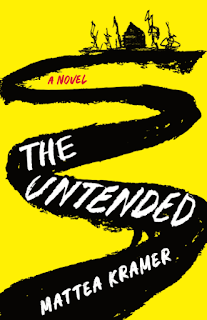Mattea Kramer is the author of the new novel The Untended. Her work has appeared in a variety of publications, including The Guardian. She lives in Amherst, Massachusetts.
Q: What inspired you to write The Untended, and how did you create your character Casch?
A: The idea for The Untended came both from my personal experiences with drugs and from the opioid crisis in my hometown, Greenfield, Massachusetts. Greenfield is not a wealthy town, and it was pretty hard-hit by opioid use.
At the same time, I come from an affluent family, and in my social life I’ve been surrounded by people who use recreational drugs – which, in that context, is okay and even cool. There’s a lot of hypocrisy there, because when people without money use drugs, it’s considered bad and dirty.
All of this made me want to write about the very human reasons behind drug use, including an effort to tolerate difficult life circumstances.
The character Casch was inspired by a young woman I met while visiting the county correctional facility in Greenfield; she had experienced addiction and had lost custody of her children. I only met this woman once, but from that meeting, Casch took on a vivid life in my imagination.
Q: The writer Nancy D. Campbell called the book a “life-affirming story of gumption, resourcefulness, and ferocious attachment.” What do you think of that description?
A: I like that description – and I’m also intrigued by the different perspectives that every reader and reviewer brings to the book.
I’m glad that Nancy found the story life-affirming, and I agree that Casch is a character of gumption and resourcefulness. I also wondered which attachment Nancy was referring to: Casch’s connection to her children? The attachment to the relief of the drug? Both are true.
Q: Did you know how the novel would end before you started writing it, or did you make many changes along the way?
A: I did not know how the novel was going to end before I started writing it, although I did have a rough plan at that time.
Really I knew very little about what was going to happen, and I only learned what would happen in the story by writing a lot of drafts over more than five years.
My approach has been to try to listen, if that makes sense. In other words, the characters are in a given situation; to me, those characters are fully alive. And I try to listen, by thinking and writing and thinking and writing, to discover how each character responds to the situation. And that is how I learned what happened in the story.
Q: How was the book’s title chosen, and what does it signify for you?
A: That’s a great question. Though I didn’t know how the book would end before I started writing it, I did have a title: It was called “G City.” I loved that title because it was a fond nickname for Greenfield, and that title stuck with the book from the time I first imagined it, around 2017, all the way until the spring of 2024.
At that point the publisher proposed that we re-title the book, because “G City” was not descriptive of what the story was about – and I agreed. I did some brainstorming, and the phrase “untended” was actually suggested by my brilliant friend Jenny Katz.
Later, all parties – including everyone at She Writes Press – unanimously agreed that “The Untended” was the perfect title for this book. To me it's a reference to how so many people, and so many important things in this world of ours, have been left untended.
Q: What are you working on now?
A: I have an idea for an essay collection inspired by the divorce and personal upheaval that I’ve been through over the past two years. But right now I’m focused on the other side of my work, in which I write op/eds and articles and reports for organizations that are working for justice in different areas, including drug policy.
Q: Anything else we should know?
A: One thing that I like to share is how much I struggled with self-doubt. I think it’s easy for all of us to imagine that other people have it together, while we personally are a mess of doubt and fear.
For a very long time I thought that I wasn’t good enough, and it took a lot of effort for me to cultivate other beliefs. Today I see that I’m doing this writerly thing in my own way, and that is beautiful.
--Interview with Deborah Kalb


Great interview! Short but deep!
ReplyDelete